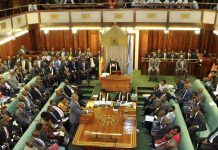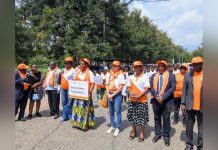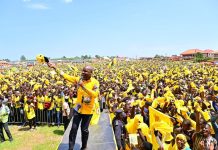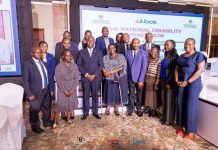Africa-Press – Uganda. Thomas Kwoyelo, a former commander in the Lord’s Resistance Army (LRA), is facing more than 70 cases of crimes he allegedly committed while serving in the LRA ranks. This week he continued his defence at the International Crimes Division (ICD) of the High Court in Gulu.
Kwoyelo, who claims to have been abducted at 13, disclosed that he experienced a disturbing ritual, the significance of which he has never comprehended to this day.
Three days after his abduction from Pabbo in Amuru District, Kwoyelo recounted that his group, commanded by one Okwera Dulmony, assembled at a homestead across the River Aswa, where a team of men was tasked with preparing a yard. They cleared a platform and carved a giant heart-shaped arena, where the abductees were instructed to march inside.
On the margin of the heart-shaped arena, stones and ashes were poured along, he stated.
“At that point, I heard them ordering 20 litres of water to be available, and all of us, the abductees, were asked to step inside the yard. They then brought cans of shea butter and a unique soil-like lime, which they mixed with water into a concoction and put there,” he said.
Seeking Kony’s spirit
He recalled that the concoction was referred to as camouflage and that all the abductees, irrespective of their sex, were ordered to strip to the waist to be smeared with the concoction.
“Once we stripped off our shirts, those people came and started marking us with the shea butter and smearing it on each of us while making a sign of the cross on our chests, belly, back, forehead, on our feet, and in our palms. That camouflage concoction was smeared on us on almost every part of our bodies, including faces and buttocks,” he told the court.
He added: “Once the smearing was done, we (the boys) were instructed to stay for three days without bathing or washing any part of our bodies, while the girls were to stay for four days without doing the same. After the four days, we were made to undergo a thorough check.
“They checked if the concoction had disappeared and put these people to one side; while those whose concoction remained were put on another end. Those whose camouflage disappeared were registered as sickly with ailments and were to wait to be presented to Kony to pray over them to heal their ailments and those of us whose traces of the concoctions remained were successfully initiated.”
The recruits were ordered not to bathe for three to four days. This was allegedly to ensure that Kony’s spirit did not depart the recruits.
Tales of rituals
In its active days, the LRA possessed different units referred to by their different names under which abductees (recruits) were assigned. For example, there were units such as medical, control, and mechanics, among others.
For instance, a recruit assigned to mechanics was to primarily learn mechanics.
“If you are assigned to a unit where the head is a medical personnel, you also learn how to treat people. When you are assigned under the command of a controller who doesn’t hold a gun but a gourd or calabash and water that he keeps sprinkling during battles, you also learn the same,” he told the court.
Recruits assigned to the mechanics unit learnt how to use wires to make replicas of different military vehicles or weapons.
“You (recruit) are also supposed to learn how to make those toys of weapons using wires, and every time there is a battle, your job in that team is to carry them for the control team who heated them on charcoal stoves,” Kwoyelo said.
Toy soldiers
Amid the chaos of battle, the control team tossed every assortment of weapons, equipment, and combat vehicles onto blazing stoves. When the stove burned hotter, it meant the enemy aimed more shots at the combat vehicles being heated.
Once the controller identified which weapons the NRA (UPDF) used most against the LRA by observing the stoves burning most intensely, he could extinguish the flames by pouring “holy” water on them.
According to Kwoyelo, once the fire in a particular stove was put out, it meant the same weapon from the enemy side had been silenced.
“When the strength of a particular weapon is not affecting the LRA very much, then the strength of the flames will slow down. From the charcoal stove, once the controller comes and chants or incarnate and pours water on the flame on the charcoal stove that is most strong, the power of the similar weapon from the NRA [UPDF] side will go down,” the ex-LRA commander said.
“If it was a machine gun hitting us the most, then the bullets from the same weapon on the NRA [UPDF] side would go up in the air and not on us. If the controller chants and pours on it the ‘holy’ water,” he added.
Tough rules
The LRA adopted a set of strange rules around hygiene and food that were directly linked to specific superstitious beliefs. Failure to comply had severe consequences, often resulting in death for the violator and detrimentally affecting the force.
For example, soldiers were prohibited from eating or using shea butter and honey since they were considered special and holy ointments. They were consequently the preserve of Kony, the LRA leader.
“We also did not eat pigeons; these were considered sacred,” he said, adding sheep (mutton) and pork to the list.
Soldiers were also neither allowed to drink alcohol nor smoke cigarettes since these negatively impacted on their ability to concentrate during operations. Kwoyelo also told the court that soldiers were forbidden from completely shaving their hair and were only permitted to trim it to a brush-like level.
“That rule was in my favour because once I shaved my hair as a child, I would immediately fall sick. However, during my entire time in captivity, I kept shaving and reducing my hair and never did dreadlocks,” Kwoyelo remarked, disputing a prosecution witness’s claim of observing him with dreadlocks.
Failed peace talks
The court also heard that after the failed 1993 peace talks at Cwero in Gulu District, Kony sent his first advance contingent, led by his deputy and field commander Lapwony Komakec Omona, into Sudan.
“The peace talks did not last the whole year and flopped while it approached October. Once [the talks] fell through, there was a lot of confusion. This prompted Kony to divide his army into two groups,” Kwoyelo said, adding, “Kony then sent Komakec Omona with one group of soldiers as an advance team to find a location where they could establish a base in Sudan.”
Weeks later, messages were sent back to Kony that Omona and the group had found a location and had established a base in Sudan at Jebelen. Kwoyelo informed the court that Kony promptly initiated the move to Sudan, leaving behind only women, the ill, and the injured who were unable to travel on foot.
“In Sudan, Kony, together with his commanders, met Omar al-Bashir [former Sudan president], who was our great supporter. In that meeting, Bashir gave Kony the rank of colonel, and other officers too were issued ranks. That was the time ranks were introduced, and the army abandoned the name Lakwena and switched to LRA,” Kwoyelo said.
The fallout
Years later, in the early 2000s, the relationship between the LRA and the Sudanese government deteriorated, leading to the Ugandan army being granted permission to enter Sudan for operations against the LRA.
In Operation Iron Fist, Sudanese government troops collaborated with the UPDF to attack Kony’s camp.
“When Kony realised that the Sudan government was siding with the Ugandan forces, he attacked both the Sudan government and the Ugandan government. That soiled the relationship between the LRA and the Sudan government, and it made the LRA lose where to camp their women and children and start retreating to Uganda,” Kwoyelo revealed.
While the operation allowed them to seize a significant amount of weapons from both the Ugandan and Sudanese forces, Kwoyelo said he faced a hardest time as the head of medical services since many of their soldiers were either wounded or killed.
“At the height of that operation, it was tough for me; it meant a lot of work for us in sickbays to treat the sick and the wounded,” Kwoyelo noted, adding, “I had a lot of work, and we worked so hard in our major sickbay to offer treatment to the injured. In Sudan, almost everyone was armed.”
Because nearly everyone in Sudan was armed at that time, including the indigenous locals in whose territory they camped, Kony had issued an order to shoot any suspicious person who was not affiliated with the LRA.
Source: Monitor
For More News And Analysis About Uganda Follow Africa-Press






